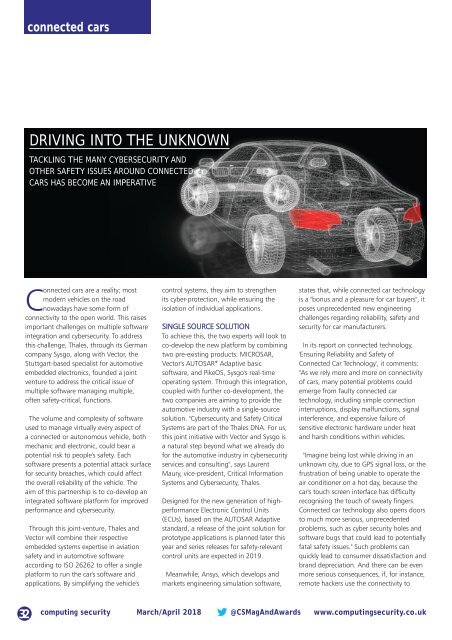Create successful ePaper yourself
Turn your PDF publications into a flip-book with our unique Google optimized e-Paper software.
connected cars<br />
DRIVING INTO THE UNKNOWN<br />
TACKLING THE MANY CYBERSECURITY AND<br />
OTHER SAFETY ISSUES AROUND CONNECTED<br />
CARS HAS BECOME AN IMPERATIVE<br />
Connected cars are a reality; most<br />
modern vehicles on the road<br />
nowadays have some form of<br />
connectivity to the open world. This raises<br />
important challenges on multiple software<br />
integration and cybersecurity. To address<br />
this challenge, Thales, through its German<br />
company Sysgo, along with Vector, the<br />
Stuttgart-based specialist for automotive<br />
embedded electronics, founded a joint<br />
venture to address the critical issue of<br />
multiple software managing multiple,<br />
often safety-critical, functions.<br />
The volume and complexity of software<br />
used to manage virtually every aspect of<br />
a connected or autonomous vehicle, both<br />
mechanic and electronic, could bear a<br />
potential risk to people's safety. Each<br />
software presents a potential attack surface<br />
for security breaches, which could affect<br />
the overall reliability of the vehicle. The<br />
aim of this partnership is to co-develop an<br />
integrated software platform for improved<br />
performance and cybersecurity.<br />
Through this joint-venture, Thales and<br />
Vector will combine their respective<br />
embedded systems expertise in aviation<br />
safety and in automotive software<br />
according to ISO 26262 to offer a single<br />
platform to run the car's software and<br />
applications. By simplifying the vehicle's<br />
control systems, they aim to strengthen<br />
its cyber-protection, while ensuring the<br />
isolation of individual applications.<br />
SINGLE SOURCE SOLUTION<br />
To achieve this, the two experts will look to<br />
co-develop the new platform by combining<br />
two pre-existing products: MICROSAR,<br />
Vector's AUTOSAR* Adaptive basic<br />
software, and PikeOS, Sysgo's real-time<br />
operating system. Through this integration,<br />
coupled with further co-development, the<br />
two companies are aiming to provide the<br />
automotive industry with a single-source<br />
solution. "Cybersecurity and Safety Critical<br />
Systems are part of the Thales DNA. For us,<br />
this joint initiative with Vector and Sysgo is<br />
a natural step beyond what we already do<br />
for the automotive industry in cybersecurity<br />
services and consulting", says Laurent<br />
Maury, vice-president, Critical Information<br />
Systems and Cybersecurity, Thales.<br />
Designed for the new generation of highperformance<br />
Electronic Control Units<br />
(ECUs), based on the AUTOSAR Adaptive<br />
standard, a release of the joint solution for<br />
prototype applications is planned later this<br />
year and series releases for safety-relevant<br />
control units are expected in 2019.<br />
Meanwhile, Ansys, which develops and<br />
markets engineering simulation software,<br />
states that, while connected car technology<br />
is a "bonus and a pleasure for car buyers", it<br />
poses unprecedented new engineering<br />
challenges regarding reliability, safety and<br />
security for car manufacturers.<br />
In its report on connected technology,<br />
'Ensuring Reliability and Safety of<br />
Connected Car Technology', it comments:<br />
"As we rely more and more on connectivity<br />
of cars, many potential problems could<br />
emerge from faulty connected car<br />
technology, including simple connection<br />
interruptions, display malfunctions, signal<br />
interference, and expensive failure of<br />
sensitive electronic hardware under heat<br />
and harsh conditions within vehicles.<br />
"Imagine being lost while driving in an<br />
unknown city, due to GPS signal loss, or the<br />
frustration of being unable to operate the<br />
air conditioner on a hot day, because the<br />
car's touch screen interface has difficulty<br />
recognising the touch of sweaty fingers.<br />
Connected car technology also opens doors<br />
to much more serious, unprecedented<br />
problems, such as cyber security holes and<br />
software bugs that could lead to potentially<br />
fatal safety issues." Such problems can<br />
quickly lead to consumer dissatisfaction and<br />
brand depreciation. And there can be even<br />
more serious consequences, if, for instance,<br />
remote hackers use the connectivity to<br />
32<br />
computing security March/April 2018 @CSMagAndAwards www.computingsecurity.co.uk

















